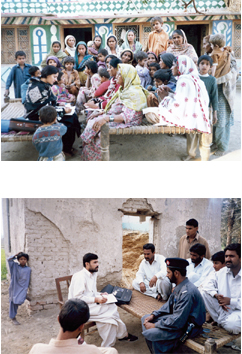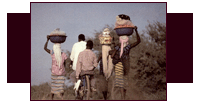|
|
Module 5: Tools for Mainstreaming Gender in Transport
5.1. Social Assessment

Photos courtesy of PhotoShare
Social assesment uses a mix of qualitative and quantitative
tools to determine the likely social impacts of a project on stakeholders,
and the likely effect of stakeholders on the project. It takes into
account the views and preferences of affected people and other stakeholders
to improve the design of the project and establish a participatory process
for project implementation and monitoring.
Gender and social diversity are one of the key entry points for social
assessment.
| Stakeholder
Categories |
Analysis
Questions |
- Intended beneficiaries
- Adversely affected persons
- Civil society
- Organized interest groups
- Government policymakers
- Implementing agency staff
- Other donors
|
- What are the most relevant stakeholder groups?
- What are the characteristics of each group?
- Social
- Location
- Size
- Organizational
Capability
- What are their interests (openness to change)?
- What is their influence?
- H = high
- M = medium
- L = low
|
|
|
Tips for Integrating Gender into Social Assessments for Transport
Projects
- Include the evaluation of gender issues as one of the key objectives.
- Integrate gender into the design of social assessments.
- Include a gender specialist on social assessment teams.
- Include both men and women in the sample population for the assessments.
- Use both men and women interviewers.
- It is usually better to interview men and women separately, as
men and women may not always speak freely in front of each other.
- Ensure interview timing takes into account men's and women's different
work schedules.
- Ensure that data is gender-disaggregated during collection and
analysis.
Social Assessment Techniques
1. Stakeholder
Consultation
Summary:
Builds consensus and ownership of gender recommendations
and action plans for transport projects.
| Technique
|
Ways to Integrate
Gender |
Stakeholder Workshop
Provides an open forum to discuss and build consensus
and ownership of the field findings and recommendations
and thus arrive at an agreement on the next steps.
This is a powerful tool for reaching a consensus
when there are contradictions among the information
gathered from different sources. |
- Include male and female population in the
sample
- Ensure that discussions address gender relations
when asking the following questions:
- Who are the target populations?
- What are their interests in the project
or policy?
- What are the power differentials among
the various categories of the target population?
- What relative influence do they have
on operations?
- Do recommendations address both equity
and efficiency?
|
|
2. Focus
Group Discussion
Summary:
Ensures transport changes are acceptable to both female
and male beneficiaries.
| Technique
|
Ways to Integrate
Gender |
Focus Group Discussion:
Facilitates open discussions to build consensus
on the perceptions, attitudes, and views of the
primary stakeholders on the objective and strategy
of the proposed project. It also aims to ensure
whether the proposed changes are acceptable to them.
|
- Include male and female population in the
sample.
- Use men and women facilitators.
- Identify sample needs, priorities, and constraints
of both male and female populations.
- Meet with men and women in separate groups.
- Schedule focus group meetings, paying attention
to men's and women's different work schedules.
- Identify and address other constraints to
women's participation, such as childcare, domestic
duties, distance, and cultural constraints.
- Ensure that discussions address gender relations
when asking the following questions:
- Who are the target populations?
- What are their interests in the project
or policy?
- What are the power differentials among
the various categories of the target population?
- What relative influence do they have
on operations?
- Do recommendations address both equity
and efficiency?
|
|
3. Social
Mapping
Summary:
Provides a visual image of perceptions regarding social,
economic, and gendered aspects of community that affect
mobility and ability to participate in transport projects.
| Technique
|
Ways to Integrate
Gender |
Social Mapping:
Provides a visual display of community members'
perceptions of the physical dimension of their community
in social and economic terms. This could be carried
out as part of a Focus Group Discussion. |
- Social Mapping Exercise: Provides a visual
display of community members' perceptions of
the physical dimension of their community in
social and economic terms. This could be carried
out as part of a Focus Group Discussion.
- Use men and women facilitators.
- Gather gender disaggregated data.
- Perform additional exercises with men and
women in separate groups.
- Schedule exercises paying attention to work
schedules of both men and women.
- Identify perceptions for both men and women
of the availability and access to various services
within the community.
|
|
4. Direct
Observation
Summary:
Examines actual behavior of women and men in the use of
and access to transport.
| Technique
|
Ways to Integrate
Gender |
Direct Observation:
Allows an opportunity to perceive the existing situation
in a selected locality. Specifically, while in the
field, the participant observer looks, listens,
asks questions, and documents detailed notes on
his/her observations. |
- Use men and women participant observers.
- Ensure observations and analysis of existing
situation provides a clear insight into gender
based differences of all topics covered.
|
|
5. Semi-structured
Interviews
Summary:
Provides an opportunity to get the perspective of beneficiaries
such as women and other excluded people who are unwilling
to speak in large groups.
| Technique
|
Ways to Integrate
Gender |
Semi-structured Interviews:
Provides a forum for one-to-one discussion in a
relaxed atmosphere on specific topics with direct
beneficiaries and secondary informants. Specifically,
it aims to provide an opportunity for self-expression
to the part of the population which is shy or otherwise
resistant to opening up in front of others. |
- Include male and female population in the
sample.
- Ensure men and women interviewers.
- Gather gender disaggregated data.
- Interview men and women separately.
- Schedule interviews paying attention to men's
and women's different work schedules.
- Identify and address constraints to women's
participation, such as childcare, domestic duties,
distance, and cultural constraints.
|
|
6. Desk
Review
Summary:
Determines availability of gender disaggregated data.
| Technique
|
Ways to Integrate
Gender |
Desk Review:
Gathers the existing documented information on the
specific topic. This tool is very relevant in getting
background information on the specific topic. Specifically
when implementing Gender Analysis, this tool specifically
aims to understand the extent of gender disaggregated
data available in the country. |
- Identify availability of data disaggregated
by gender.
- If yes, identify areas covered.
- Identify major gaps in the information.
- Gather gender disaggregated data.
|
|
|
Social Assessment for Lesotho Road, Rehabilitation
and Maintenance Project Examines Past Experience in Employing
Women in Road Construction and Maintenance.
This targeted assessment helped the project focus on gender issues
and resulted in concrete actions among project managers and communities
to include women in labor-based works. The questions addressed ranged
from understanding the experience of both women and men in the labor-based
work groups to identifying how to create equitable systems of pay
and use participatory methods to identify strategic jobs for women
in construction work.
|
Social Assessment Resources
See Module 6 for a complete listing of gender and transport resources
organized by type of resource and issues. The list below includes resources
on topics presented in this section of Module 5.
|

